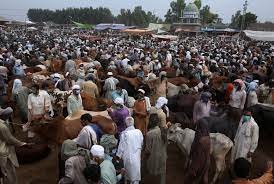As the festive season of Eid ul-Adha approaches, residents of Karachi, Pakistan’s largest metropolis, are facing an alarming rise in street crimes. Criminals are increasingly targeting individuals carrying sacrificial animals, which can fetch significant sums of money. The city has witnessed a surge in robberies and thefts, leading to a growing sense of insecurity among the population. This article explores the escalation of street crimes in Karachi and its impact on the upcoming Eid ul-Adha celebrations.
Rising Street Crimes and Disturbing Statistics
According to the Sindh Citizens-Police Liaison Committee (CPLC), street crimes in Karachi have surged in the first five months of 2023. More than 3,000 incidents have been reported, resulting in the loss of lives of 46 individuals who resisted robberies. The grim statistics reveal a disturbing trend where criminals have become more audacious, with an increasing number of cases involving violence.
The criminals have expanded their targets beyond traditional lootings, focusing on stealing sacrificial animals, snatching mobile phones, and stealing motorcycles and cars. Mobile phone snatching alone accounts for over 21,000 incidents, while more than 20,000 motorcycles and cars have been reported stolen or snatched. Such acts not only jeopardize the financial stability of the victims but also instill fear and anxiety in the community.
Eid ul-Adha: A Time of Celebration and Vulnerability
Eid ul-Adha, also known as the “Festival of Sacrifice,” is a significant religious observance for Muslims worldwide. It commemorates the willingness of Prophet Ibrahim (Abraham) to sacrifice his son as an act of obedience to God. During this time, Muslims purchase livestock, particularly goats, cows, and camels, to sacrifice and distribute meat among family, friends, and the less fortunate.
However, the rising incidents of street crimes have cast a dark shadow over this joyous occasion. The increased targeting of individuals carrying sacrificial animals poses a grave threat to both their financial investments and personal safety. The exorbitant prices of these animals, often reaching thousands and lakhs of rupees, make them an attractive target for criminals seeking quick gains.
Changing Dynamics of Street Crimes
What is particularly concerning is the evolving nature of street crimes in Karachi. Criminals have grown bolder, resorting to daring hold-ups not only in crowded marketplaces but also in restaurants and even graveyards. The audacity displayed by these criminals highlights the urgent need for effective law enforcement measures to curb this growing menace.
Impact on Karachi’s Population
The escalating street crimes have had a detrimental effect on the over 17 lakh (1.7 million) residents of Karachi. The fear of becoming a victim of a robbery or theft has permeated daily life, making people reluctant to venture out or carry valuable possessions. The increasing prevalence of such crimes has created a sense of helplessness and frustration among the populace, tarnishing the image of the city.
Addressing the Crisis: Government Initiatives and Public Cooperation
To combat the rising street crimes, it is imperative for the government and law enforcement agencies to take swift action. Authorities must enhance police presence, especially in areas prone to criminal activities. Increased surveillance, better coordination among law enforcement agencies, and the utilization of modern technology can significantly aid in deterring criminals and facilitating prompt responses to incidents.
Equally important is fostering public cooperation and awareness. The community must be encouraged to report crimes promptly and share information that could assist in apprehending the culprits. Citizens can also adopt precautionary measures such as avoiding isolated areas, securing their valuables, and utilizing alternative modes of transportation to minimize the risk of becoming a victim.




